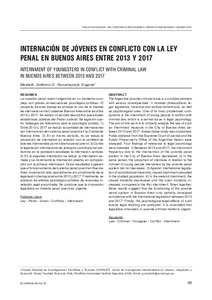Por favor, use este identificador para citar o enlazar este ítem:
https://repositorio.uca.edu.ar/handle/123456789/13938| Título: | Internación de jóvenes en conflicto con la ley penal en Buenos Aires entre 2013 y 2017 Internment of youngsters in conflict with criminal law in Buenos Aires between 2013 and 2017 |
Autor: | Macbeth, Guillermo Razumiejczyk, Eugenia |
Palabras clave: | LEY; PENAS PRIVATIVAS DE LA LIBERTAD; INTERNACION; JOVENES | Fecha de publicación: | 2021 | Editorial: | Universidad de Buenos Aires. Facultad de Psicología | Cita: | Macbeth, G., Razumiejczyk, E. Internación de jóvenes en conflicto con la ley penal en Buenos Aires entre 2013 y 2017 [en línea]. Anuarios de investigaciones. 2021, 28. Disponible en: https://repositorio.uca.edu.ar/handle/123456789/13938 | Resumen: | Resumen: La cuestión penal juvenil argentina es un problema complejo
con graves consecuencias psicológico-jurídicas. El
propósito de este trabajo es analizar el uso de la medida
de internación en la Ciudad de Buenos Aires entre los años
2013 y 2017. Se realizó un estudio descriptivo que empleó
estadísticas públicas del Poder Judicial. Se lograron cuatro
hallazgos de relevancia para la psicología jurídica. 1)
Entre 2013 y 2017 se redujo la cantidad de internaciones
por intervención del sistema penal juvenil en la Ciudad de
Buenos Aires. 2) En el mismo período, no se redujo la
proporción de internados en relación con la cantidad de
jóvenes intervenidos por el sistema penal juvenil. 3) Contra
la legislación internacional de jerarquía constitucional predominó
en la población estudiada la internación cerrada.
4) En la segunda internación se redujo la internación cerrada
y se incrementó la internación abierta, en comparación
con la primera internación. Estos resultados sugieren
que el funcionamiento del sistema penal juvenil en Buenos
Aires incrementó sólo parcialmente el cumplimiento de la
legislación internacional entre 2013 y 2017. Finalmente, se
analizan los efectos psicológico-jurídicos de la escasa nivelación
legal encontrada. Se concluye que la innovación
legislativa en materia penal juvenil es urgente. Abstract: The Argentine juvenile criminal issue is a complex problem with serious consequences. It includes philosophical, legal, legislative, historical and political dimensions, as well as psychological ones. One of its most problematic components is the internment of young people in conflict with criminal law, which is a central issue in legal psychology. The aim of this work is to critically analyze the use of such an internment measure in the City of Buenos Aires between 2013 and 2017. A descriptive study was conducted. Public statistics from the Supreme Court of Justice and the Public Prosecutor’s Office of the Argentine Nation were analyzed. Four findings of relevance to legal psychology were obtained. 1) Between 2013 and 2017, the internment frequency due to the intervention of the juvenile penal system in the City of Buenos Aires decreased. 2) In the same period, the proportion of internees in relation to the number of young people intervened by the juvenile penal system did not decrease. 3) Against international legislation of constitutional hierarchy, closed internment prevailed in the studied population. 4) In the second internment, the closed modality decreased and the open modality increased, compared to the first internment. Taken together, these results suggest that the functioning of the juvenile penal system in Buenos Aires only partially increased compliance with the international legislation between 2013 and 2017. Finally, the psychological-legal effects of such scarce legal leveling are analyzed. It is concluded that legislative innovation in juvenile criminal matter is urgent. |
Cobertura Espacial: | Buenos Aires (Argentina : Provincia) | Cobertura Temporal: | SIGLO XXI | URI: | https://repositorio.uca.edu.ar/handle/123456789/13938 | ISSN: | 0329- 5885 (impreso) 1851- 1686 (on line) |
Disciplina: | PSICOLOGIA | Derechos: | Acceso abierto | Fuente: | Anuarios de investigaciones. 2021, 28 |
| Aparece en las colecciones: | Artículos |
Ficheros en este ítem:
| Fichero | Descripción | Tamaño | Formato | |
|---|---|---|---|---|
| internación-jóvenes-conflicto-ley.pdf | 273,62 kB | Adobe PDF |  Visualizar/Abrir |
Visualizaciones de página(s)
64
comprobado en 27-abr-2024
Descarga(s)
68
comprobado en 27-abr-2024
Google ScholarTM
Ver en Google Scholar
Este ítem está sujeto a una Licencia Creative Commons

